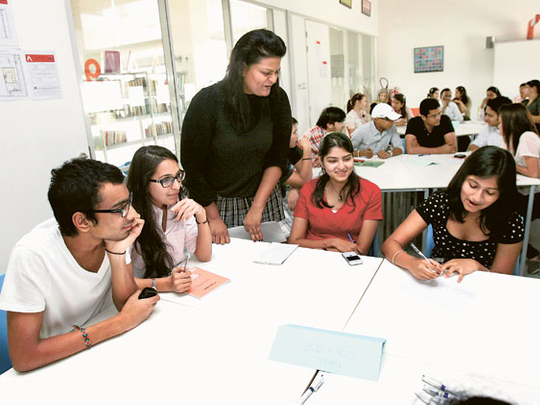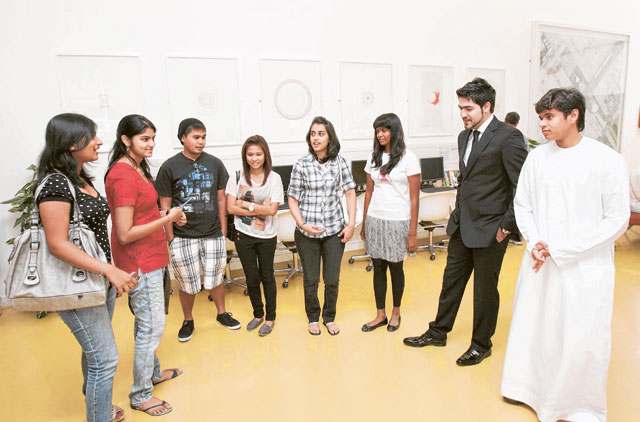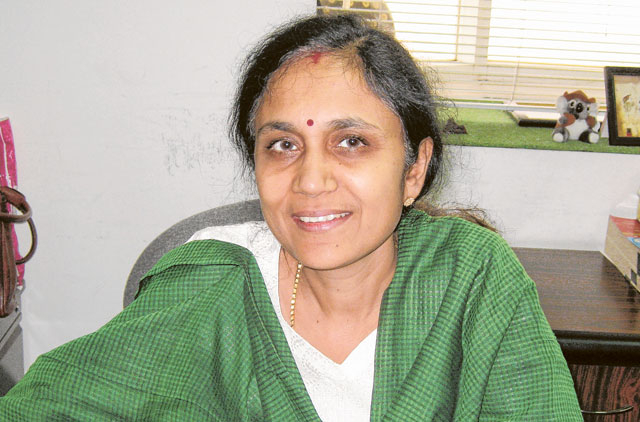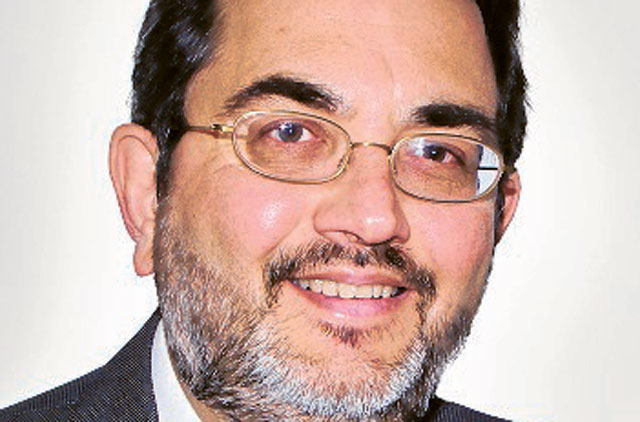
Dubai: It was an unlikely mix of students who had gathered at the British Council in Dubai last Saturday. Shreya Narayanan, Ahmad Al Emadi, Leonid Stolyarov, Hyacinth Austria… they were of different nationalities and backgrounds.
But they had a common purpose. All heading to the UK for higher studies, they were making the most of the council's pre-departure briefing.
Such orientations - which are also organised by the US Embassy in Abu Dhabi for US-bound students - have become an annual ritual as thousands of students leave the UAE for greener pastures abroad.
Focus on higher education in the UAE
After years of grooming in the country's primary and secondary schools, they suddenly make a mass exodus for higher learning.
The question is why do they make a beeline to other destinations (see box below) when the UAE has 72 institutions of higher education offering over 500 academic programmes?
The reasons are not far to seek. Barring a few exceptions, most institutions are branch campuses of international universities and are not considered as good - especially since they do not carry a cost advantage (see Cost Factor). Parents and students still have reservations about the colleges' quality, competitiveness and reputation. A poor track record of relocations, even closure, of some campuses has not helped matters either.
"The UAE is still young in international education. It's unfair to compare it with countries that have a long history. The confidence that people have in the country's primary and secondary education is yet to show at the tertiary level," said Shyamala Elango of educational consultancy Inner Universe, 40 per cent of whose students have been placed in Ivy League colleges.
Last year over 500 students were overnight forced to shuttle between Dubai and Ras Al Khaimah after the licences of three institutions - Mahatma Gandhi University, International Institute for Management and Technology and the UEIMS Medical Science University - were cancelled by the Knowledge and Human Development Authority (KHDA) in Dubai for failing to meet prescribed standards. University of Southern Queensland and Dubai Aerospace Enterprise University were also asked to close shop.
And then there are universities which have shut down due to the poor response from students. Among them: the Indian University of Pune's Ras Al Khaimah campus, Michigan State University's branch campus at the Dubai Academic City and George Mason University in Ras Al Khaimah. "Closure of universities does tend to affect confidence. There are good colleges here, but how many are they?" said Sanjeev Verma, Director of educational consultancy Intelligent Partners, that places 350-500 students in overseas colleges every year.
Sent for re-evaluation
The number of programmes that have recently come for review by the Commission for Academic Accreditation has also risen. Among them: a physical therapy degree at Gulf Medical University, degree in information studies at Ajman University of Science and Technology, software engineering master's degree at Al Hosn University and a business administration master's degree at New York Institute of Technology.
"You probably have some of the best universities here replicating what they do elsewhere. But that's not good enough as one is not sure of the infrastructure," said Indian resident Sharmila Narayanan, whose daughter Shreya is headed to the UK to study medicine.
"It's as much about quality as it is about the image," said Russian Julia Stolyarova, mother of Leonid, who plans to do Computer Engineering in the UK.
Stolyarov is sceptical about the course content. "Many colleges here are not supported by good programmes," he said.
Nothing illustrates the worrying pattern of enrolment better than a KHDA study last year. Of the students entering college, only nine per cent went for engineering and just three per cent for medicine. Equally dismal was the representation of programmes at the doctorate level - 0.4 per cent.
"Students are more aware of international options today as they are better informed. They are more travelled and undertake campus visits and summer courses abroad as a prelude to choosing their destinations," said Elango.
Hyacinth Austria, who studied interior designing in Dubai and is now preparing for graduation in landscaping and urbanism in the UK, said, "I visited the UK campus and was struck by their faculty and curriculum. My professors in Dubai were architects who had no experience in interior designing. It's more of class work here than going out on the field."
In contrast, opportunities for practical work abound abroad. An Indian student from Dubai who went to Babson College in the US last year is already in the news after an idea he floated drew the attention of venture capitalists, his counsellor said, adding that the university was fully backing him with legal and business advice.
"Unless the local environment absorbs students, graduates will look for job opportunities elsewhere," said Sanjeev Verma.
"The US education system is unrivalled in the choice of institutions, academic and social environments, degree programmes and subjects," Stephanie Sandoval, Cultural Affairs Officer at the US Embassy in Abu Dhabi. UAE students also get government scholarships.
Similarly, the UK holds many attractions - established traditions in world renowned colleges, three-year undergraduate options and proximity to the UAE. It's not as far as the US, Canada or Australia, so students are far enough to feel independent, yet close enough that parents have peace of mind," said Lara Khouri, UK Marketing Manager at the British Council.
With regard to India, another hotspot, Indian Consul General Sanjay Verma said, "Affordable and quality education makes India a preferred destination for higher education. The competitive environment in India ensures that our students can adapt to any real life situation."
The Cost Factor
The cost of education in the UAE is on a par with that in the UK, Australia or Canada. "On an average, it is about 60-70 per cent of what it costs in the US," said Shyamala Elango of Inner Universe. Students residing in the UAE don't have to factor the extra cost of living or travel.
"The cost of an engineering degree in the US varies. Tuition and expenses can range from $12,000-$47,000 (Dh44,000-Dh172,500)," said Stephanie Sandoval, Cultural Affairs Officer at the US Embassy.
"While tuition costs in the US can be high, there are many fine instituions with more affordable fees and frequently there are programmes, ranging from scholarships to loans to work/study arrangements that help defray the cost," she said.
Lara Khouri, UK Marketing Manager at the British Council, said the cost of education in the UK depends on the university, its location, specialisation, accommodation etc. "A full-time undergraduate Civil Engineering degree at City University in UK would cost £11,500 (Dh69,000) for non-EU students as against £11,420 at a prominent Dubai university, she added.
Indian Consul General Sanjay Verma said fees in some of India's engineering colleges could be less than Rs500,000 (Dh40,000). "Given the overheads here (UAE), average cost of a graduate/post-graduate programme would be higher than in India."
A 2011 International Pricing Study by UK Higher Education International Unit said a Harvard programme costs £18,531 a year. It said a course in history at Oxford costs £12,000, as against £16,000 in an Australian varsity.
Preferred Destinations
The US and the UK are the most preferred destinations. Stephanie Sandoval, Cultural Affairs Officer at the US Embassy in Abu Dhabi, said, 1,653 Emirati students left for the US in 2009-10 - a 35.7 per cent increase over the previous year. "In addition, we believe there are around 2,500 more students of other nationalities from the UAE."
Similarly, Lara Khouri, UK Marketing Manager at the British Council, said 33.8 per cent of the 3,105 students who went to the UK in 2009-2010 were Emiratis, followed by 16.4 per cent Indians.
Exact figures for NRI students who go to India were not available, but Indian Consul General Sanjay Verma said 168 student visas were issued to non-Indians in 2009.
Countries like Canada, Australia and Singapore are also witnessing rising influx of students from the UAE.
Did you know?
Government institutions of higher education are free for Emiratis, while charges at private institutions can go up to $25,000 annually.
















